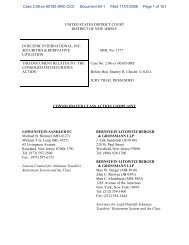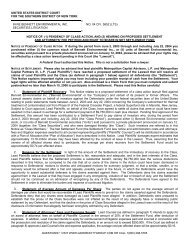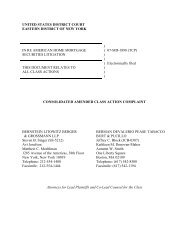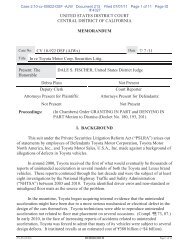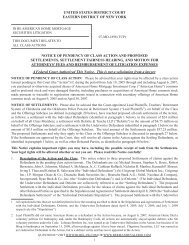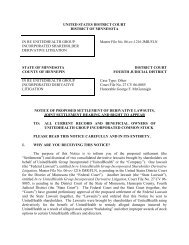to view the Lawdragon's - Bernstein Litowitz Berger & Grossmann LLP
to view the Lawdragon's - Bernstein Litowitz Berger & Grossmann LLP
to view the Lawdragon's - Bernstein Litowitz Berger & Grossmann LLP
Create successful ePaper yourself
Turn your PDF publications into a flip-book with our unique Google optimized e-Paper software.
minorities of Albanians and Bosniaks, was never going <strong>to</strong>have a groundswell of popular support for domestic warcrimes trials.Of course, resistance within <strong>the</strong> government is <strong>the</strong>more problematic fac<strong>to</strong>r in pursuing war crimes cases.Milosevic’s fall did not bring a lustration or vetting policy –as seen, for example, in Eastern Europe after <strong>the</strong> dissolutionof <strong>the</strong> Soviet bloc – that would have removed some of<strong>the</strong> corrupt and criminal elements from <strong>the</strong> governmentand mitigated <strong>the</strong> disastrous effects of his legacy.Many people in <strong>the</strong> army and <strong>the</strong> police have a vestedinterest in blocking cases."Obstruction is often inherent in <strong>the</strong>se cases," Vukcevicsaid. "There are people within <strong>the</strong> police and militaryranks who are still holding important positions in <strong>the</strong>seinstitutions and who – directly or indirectly – wereinvolved in war crimes. They will do anything in order <strong>to</strong>evade criminal prosecution."One commonly cited problem, which Ellis had warnedagainst in 2003, was <strong>the</strong> placement of <strong>the</strong> new war crimesinvestigations unit within <strong>the</strong> police forces, which means<strong>the</strong> unit is often investigating its own colleagues and hasbeen <strong>view</strong>ed as trai<strong>to</strong>rous. Human rights groups havequestioned <strong>the</strong> unit’s initiative on occasion. In 2006,<strong>the</strong> Humanitarian Law Center successfully lobbiedfor <strong>the</strong> removal of <strong>the</strong> head of <strong>the</strong> war crimesinvestigations unit and two o<strong>the</strong>r members by contendingthat <strong>the</strong>y were present in Kosovo in 1999 during <strong>the</strong>commission of war crimes.War crimes cases are almost always extremelycomplicated, regardless of <strong>the</strong> jurisdiction or <strong>the</strong> precedingconflict, often as a result of evidentiary challengescreated by a lack of paper trails or o<strong>the</strong>r documentationof criminal intent. This leads <strong>to</strong> a reliance on witnesseswho, whe<strong>the</strong>r <strong>the</strong>y are victims or “insiders” withknowledge of criminal acts, will likely be reluctant <strong>to</strong>testify. In <strong>the</strong> former Yugoslavia, witnesses are scatteredthroughout <strong>the</strong> region, often outside <strong>the</strong> jurisdiction of<strong>the</strong> cases <strong>to</strong> which <strong>the</strong>y are relevant.The OSCE has worked <strong>to</strong> facilitate cooperation between<strong>the</strong> different domestic prosecution offices for war crimes.Cooperation has been most effective between Serbia andCroatia, which entered in<strong>to</strong> an agreement in 2006 over <strong>the</strong>exchange of evidence and cases <strong>to</strong> work around each country’sbarring of extradition of <strong>the</strong>ir nationals. Serbia and Bosnia-Herzegovina have not reached a similar pact. Leaders of <strong>the</strong>three countries have also failed <strong>to</strong> iron out an agreementthat would have each government focus on prosecuting itsown citizens. This is desirable because <strong>the</strong> issuing of arrestwarrants by one country for ano<strong>the</strong>r country’s citizenshas been controversial and often criticized as politicallymotivated. In one well-known example, a court in Londonin 2010 refused Serbia’s request for <strong>the</strong> extradition of EjupGanic, a former member of <strong>the</strong> Bosnian presidency, for hisalleged responsibility for war crimes against <strong>the</strong> Yugoslavarmy. In 2011, an Austrian court refused an extraditionrequest for former Bosnia-Herzegovina General Jovan Divjak,also wanted by Serbia authorities.Relations between Serbia and Croatia also <strong>to</strong>ok anegative turn last year when Croatia’s parliament – inresponse <strong>to</strong> an indictment of Croat defendants forwardedon <strong>to</strong> Croatian prosecu<strong>to</strong>rs by Vukcevic’s office – passeda law purporting <strong>to</strong> invalidate all laws in Serbia thatdeal with <strong>the</strong> prosecution of Croatian citizens from <strong>the</strong>war. (Croatia’s prosecu<strong>to</strong>r did not support <strong>the</strong> act and hascontinued <strong>to</strong> cooperate with Vukcevic’s team.)Yet Serbia’s war crimes prosecution office has hadsome advantages, including <strong>the</strong> transfer of evidencefrom cases that <strong>the</strong> ICTY had already completed orinitiated, giving Vukcevic’s team a head start in some domesticcases. The office also had evidentiary assistance fromKandic and <strong>the</strong> Humanitarian Law Center, which has beenwidely praised for locating witnesses in victim populationsand securing <strong>the</strong>ir participation at trials. (In Serbia’slegal system, civil society organizations can representvictims in <strong>the</strong> trials and can file private criminal complaintsin matters where <strong>the</strong> government has not acted.)“They unders<strong>to</strong>od my explanation that <strong>the</strong>y shouldfight for justice by directly participating in <strong>the</strong> trials, bytestifying in court, because that means <strong>the</strong>ir testimony willlive forever in <strong>the</strong> record,” Kandic explained in an inter<strong>view</strong>.“Nobody can manipulate <strong>the</strong>ir testimony. Every word from<strong>the</strong>ir testimony will be <strong>the</strong>re forever. They unders<strong>to</strong>od whythat’s important.”The international assistance has also been ongoing,in Serbia and elsewhere in <strong>the</strong> region. It culminatedin recent years with <strong>the</strong> War Crimes Justice Project, afour-million-Euro effort funded by <strong>the</strong> European Unionand run collaboratively by <strong>the</strong> OSCE, <strong>the</strong> ICTY and<strong>the</strong> U.N.’s Interregional Crime and Justice ResearchInstitute. According <strong>to</strong> <strong>the</strong> OSCE's website, <strong>the</strong> projectprovided training <strong>to</strong> 800 legal professionals in <strong>the</strong> regionand produced curriculum materials on internationalcriminal law and ICTY caselaw that are tailored <strong>to</strong> eachnation’s justice system. Part of <strong>the</strong> funding was used <strong>to</strong>translate tens of thousands of pages of ICTY trialtranscripts and appellate decisions in<strong>to</strong> local languagesfor use by national prosecu<strong>to</strong>rs and judges. The projectalso funded additional staff positions in <strong>the</strong> nationalchambers and prosecu<strong>to</strong>r offices.Perhaps more important is what this assistance hasrepresented over <strong>the</strong> years – clear support of <strong>the</strong> domesticsystem by <strong>the</strong> European Union and <strong>the</strong> United States.Nationalistic politicians and media outlets have been vocalin <strong>the</strong>ir criticism of figures like Vukcevic and Kandic, but<strong>the</strong> importance of economic aid and <strong>the</strong> prospect of EUmembership have prevented <strong>the</strong>se hostile forces fromshutting <strong>the</strong> domestic system down.L A W D R A G O N 44 I s s u e 13



